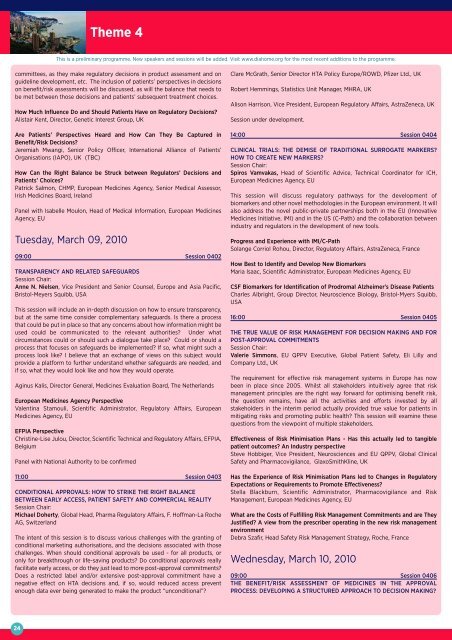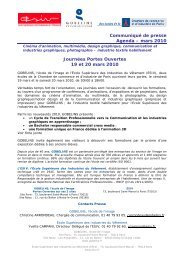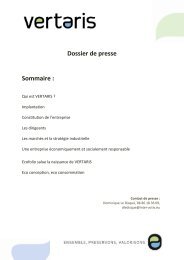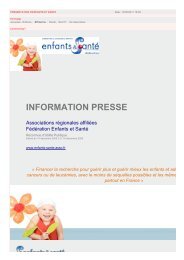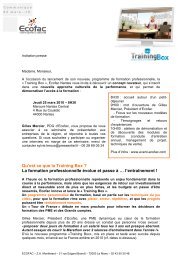Pre-Conference Tutorials, Monday, March 8, 2010, 09:00
Pre-Conference Tutorials, Monday, March 8, 2010, 09:00
Pre-Conference Tutorials, Monday, March 8, 2010, 09:00
You also want an ePaper? Increase the reach of your titles
YUMPU automatically turns print PDFs into web optimized ePapers that Google loves.
24<br />
Theme 4<br />
This is a preliminary programme. New speakers and sessions will be added. Visit www.diahome.org for the most recent additions to the programme.<br />
committees, as they make regulatory decisions in product assessment and on<br />
guideline development, etc. The inclusion of patients’ perspectives in decisions<br />
on benefit/risk assessments will be discussed, as will the balance that needs to<br />
be met between those decisions and patients’ subsequent treatment choices.<br />
How Much Influence Do and Should Patients Have on Regulatory Decisions?<br />
Alistair Kent, Director, Genetic Interest Group, UK<br />
Are Patients’ Perspectives Heard and How Can They Be Captured in<br />
Benefit/Risk Decisions?<br />
Jeremiah Mwangi, Senior Policy Officer, International Alliance of Patients’<br />
Organisations (IAPO), UK (TBC)<br />
How Can the Right Balance be Struck between Regulators’ Decisions and<br />
Patients’ Choices?<br />
Patrick Salmon, CHMP, European Medicines Agency, Senior Medical Assessor,<br />
Irish Medicines Board, Ireland<br />
Panel with Isabelle Moulon, Head of Medical Information, European Medicines<br />
Agency, EU<br />
Tuesday, <strong>March</strong> <strong>09</strong>, <strong>2010</strong><br />
<strong>09</strong>:<strong>00</strong> Session 0402<br />
TRANSPARENCY AND RELATED SAFEGUARDS<br />
Session Chair:<br />
Anne N. Nielsen, Vice <strong>Pre</strong>sident and Senior Counsel, Europe and Asia Pacific,<br />
Bristol-Meyers Squibb, USA<br />
This session will include an in-depth discussion on how to ensure transparency,<br />
but at the same time consider complementary safeguards. Is there a process<br />
that could be put in place so that any concerns about how information might be<br />
used could be communicated to the relevant authorities? Under what<br />
circumstances could or should such a dialogue take place? Could or should a<br />
process that focuses on safeguards be implemented? If so, what might such a<br />
process look like? I believe that an exchange of views on this subject would<br />
provide a platform to further understand whether safeguards are needed, and<br />
if so, what they would look like and how they would operate.<br />
Aginus Kalis, Director General, Medicines Evaluation Board, The Netherlands<br />
European Medicines Agency Perspective<br />
Valentina Stamouli, Scientific Administrator, Regulatory Affairs, European<br />
Medicines Agency, EU<br />
EFPIA Perspective<br />
Christine-Lise Julou, Director, Scientific Technical and Regulatory Affairs, EFPIA,<br />
Belgium<br />
Panel with National Authority to be confirmed<br />
11:<strong>00</strong> Session 0403<br />
CONDITIONAL APPROVALS: HOW TO STRIKE THE RIGHT BALANCE<br />
BETWEEN EARLY ACCESS, PATIENT SAFETY AND COMMERCIAL REALITY<br />
Session Chair:<br />
Michael Doherty, Global Head, Pharma Regulatory Affairs, F. Hoffman-La Roche<br />
AG, Switzerland<br />
The intent of this session is to discuss various challenges with the granting of<br />
conditional marketing authorisations, and the decisions associated with those<br />
challenges. When should conditional approvals be used - for all products, or<br />
only for breakthrough or life-saving products? Do conditional approvals really<br />
facilitate early access, or do they just lead to more post-approval commitments?<br />
Does a restricted label and/or extensive post-approval commitment have a<br />
negative effect on HTA decisions and, if so, would reduced access prevent<br />
enough data ever being generated to make the product “unconditional”?<br />
Clare McGrath, Senior Director HTA Policy Europe/ROWD, Pfizer Ltd., UK<br />
Robert Hemmings, Statistics Unit Manager, MHRA, UK<br />
Alison Harrison, Vice <strong>Pre</strong>sident, European Regulatory Affairs, AstraZeneca, UK<br />
Session under development.<br />
14:<strong>00</strong> Session 0404<br />
CLINICAL TRIALS: THE DEMISE OF TRADITIONAL SURROGATE MARKERS?<br />
HOW TO CREATE NEW MARKERS?<br />
Session Chair:<br />
Spiros Vamvakas, Head of Scientific Advice, Technical Coordinator for ICH,<br />
European Medicines Agency, EU<br />
This session will discuss regulatory pathways for the development of<br />
biomarkers and other novel methodologies in the European environment. It will<br />
also address the novel public-private partnerships both in the EU (Innovative<br />
Medicines Initiative, IMI) and in the US (C-Path) and the collaboration between<br />
industry and regulators in the development of new tools.<br />
Progress and Experience with IMI/C-Path<br />
Solange Corriol Rohou, Director, Regulatory Affairs, AstraZeneca, France<br />
How Best to Identify and Develop New Biomarkers<br />
Maria Isaac, Scientific Administrator, European Medicines Agency, EU<br />
CSF Biomarkers for Identification of Prodromal Alzheimer's Disease Patients<br />
Charles Albright, Group Director, Neuroscience Biology, Bristol-Myers Squibb,<br />
USA<br />
16:<strong>00</strong> Session 0405<br />
THE TRUE VALUE OF RISK MANAGEMENT FOR DECISION MAKING AND FOR<br />
POST-APPROVAL COMMITMENTS<br />
Session Chair:<br />
Valerie Simmons, EU QPPV Executive, Global Patient Safety, Eli Lilly and<br />
Company Ltd., UK<br />
The requirement for effective risk management systems in Europe has now<br />
been in place since 2<strong>00</strong>5. Whilst all stakeholders intuitively agree that risk<br />
management principles are the right way forward for optimising benefit risk,<br />
the question remains, have all the activities and efforts invested by all<br />
stakeholders in the interim period actually provided true value for patients in<br />
mitigating risks and promoting public health? This session will examine these<br />
questions from the viewpoint of multiple stakeholders.<br />
Effectiveness of Risk Minimisation Plans - Has this actually led to tangible<br />
patient outcomes? An Industry perspective<br />
Steve Hobbiger, Vice <strong>Pre</strong>sident, Neurosciences and EU QPPV, Global Clinical<br />
Safety and Pharmacovigilance, GlaxoSmithKline, UK<br />
Has the Experience of Risk Minimisation Plans led to Changes in Regulatory<br />
Expectations or Requirements to Promote Effectiveness?<br />
Stella Blackburn, Scientific Administrator, Pharmacovigilance and Risk<br />
Management, European Medicines Agency, EU<br />
What are the Costs of Fulfilling Risk Management Commitments and are They<br />
Justified? A view from the prescriber operating in the new risk management<br />
environment<br />
Debra Szafir, Head Safety Risk Management Strategy, Roche, France<br />
Wednesday, <strong>March</strong> 10, <strong>2010</strong><br />
<strong>09</strong>:<strong>00</strong> Session 0406<br />
THE BENEFIT/RISK ASSESSMENT OF MEDICINES IN THE APPROVAL<br />
PROCESS: DEVELOPING A STRUCTURED APPROACH TO DECISION MAKING?


